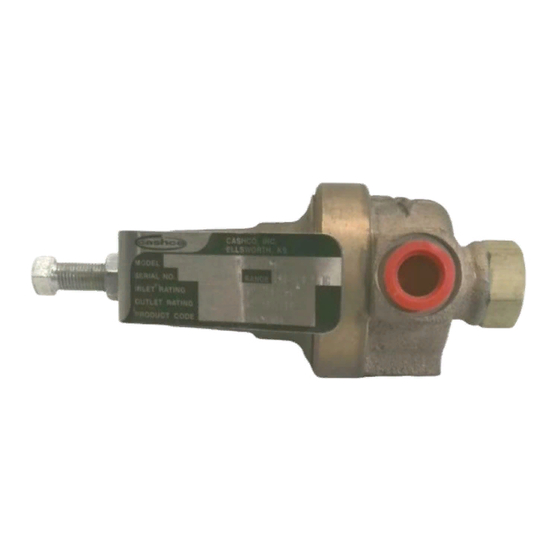cashco 4381 Руководство по установке, эксплуатации и техническому обслуживанию - Страница 2
Просмотреть онлайн или скачать pdf Руководство по установке, эксплуатации и техническому обслуживанию для Контроллер cashco 4381. cashco 4381 10 страниц. Pressure reducing regulators
Также для cashco 4381: Руководство по установке, эксплуатации и техническому обслуживанию (8 страниц)

10 A. Basic Regulator - (Refer to Figure 1, Model 3381
or 4381): Regulator may be rotated around the
pipe axis 360°. Recommended position is with
spring chamber vertical upwards. Orient such
that the spring chamber vent hole does not collect
rain wa ter.
10B.
Cryogenic Regulator - Options 3381-5 and 4381-
36 (Refer to Figure 2, Model 3381 or 4381):
a. Recommended installation is with spring
cham ber hanging directly be low the body in a
III. PRINCIPLE OF OPERATION
1. Movement occurs as pressure variations register
on the diaphragm. The registering pressure is
the outlet, P
, or downstream pressure.
2
range spring opposes di a phragm movement. As
IV. STARTUP
The maximum outlet pressure is list ed on the name plate
as the upper range spring pres sure level, and is the
rec om mend ed "upper operative limit" for the sens ing
diaphragm (See Section IV. Startup, Step 7). Higher press-
ures could dam age the di a phragm. (Field hydro static
tests fre quent ly de stroy dia phragms. DO NOT HYDRO-
STATIC TEST THROUGH AN IN STALLED UNIT; ISO LATE
FROM TEST.)
1. Start with the block valves closed. A by pass
valve may be used to maintain out let pres sure
in the down stream sys tem without changing the
fol low ing steps.
2. Relax the range spring by turning the adjusting
screw counter clockwise (CCW) a minimum of
three (3) full revolutions. This reduces the outlet
(down stream) pres sure set point.
3. If it is a "hot" piping system, and equipped with
a bypass valve, slowly open the bypass valve
to preheat the system piping and to allow slow
ex pan sion of the piping. Ensure proper steam
trap operation if installed. Closely monitor outlet
(down stream) pres sure via gauge to ensure not
over-pressurizing. NOTE: If no bypass valve is
in stalled, extra caution should be used in starting
up a cold system; i.e. do everything slowly.
4. Crack open the outlet (downstream) block valve.
2
CAUTION
ver ti cal down wards orientation. Allows water
to drain; etc.
b. Recommend inert purge gas be supplied to
spring cham ber through vent hole and be
discharged out drain hole.
11. Regulators are not to be buried un der ground.
12. For insulated piping systems, recommendation is
to not insulate regulator.
SECTION III
outlet pressure drops, the range spring pushes
the dia phragm down, opening the port; as outlet
pres sure in creas es, the diaphragm pushes up
and the port opening clos es.
The
2. A complete diaphragm failure will cause the
reg u la tor to fail open.
SECTION IV
5. Slowly open the inlet (upstream) block valve
ob serv ing the outlet (downstream) pressure
gauge. De ter mine if the regulator is flowing. If
not, slowly rotate the regulator adjusting screw
clockwise (CW) until flow begins.
6. Continue to slowly open the inlet (upstream) block
valve until fully open.
7. Continue to slowly open the outlet (downstream)
block valve, especially when the downstream
pip ing system isn't pressurized.
(down stream) pressure exceeds the desired
pres sure, close the block valve and go to Step 2,
then return to Step 4.
8. When flow is established steady enough that the
outlet (downstream) block valve is fully open,
be gin to slowly close the bypass valve if installed.
9. Develop system flow to a level near its expected
normal rate, and reset the regulator set point by
turning the adjusting screw CW to increase outlet
pressure, or CCW to reduce outlet pressure.
10. Reduce system flow to a minimum level and
ob serve set point. Outlet pressure will rise from
the set point of Step 9. The maximum rise in
outlet pressure on decreasing flow should not
exceed the stated up per limit of the range spring
by greater than 10%; i.e. 20-80 psig (1.38-5.52
Barg) range spring. (Example: at low flow the
outlet pressure should not exceed 88 psig (6.07
barg), if it does, con sult factory).
If the outlet
CAUTION
IOM-3381/4381
